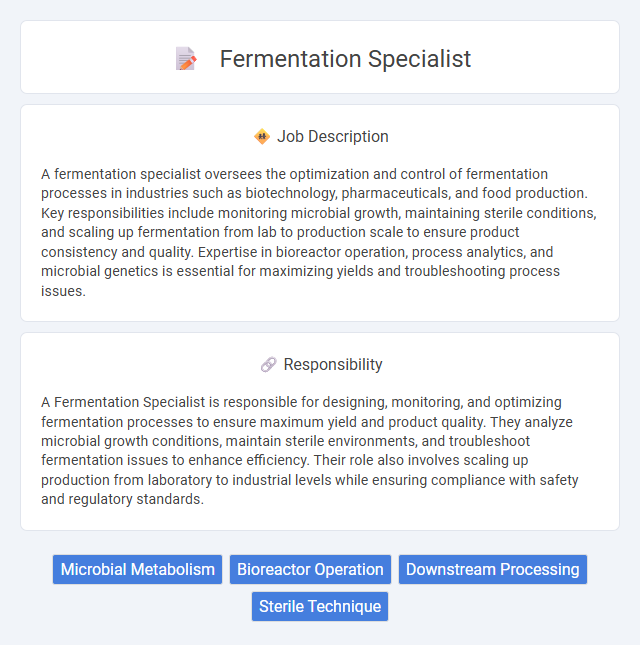
A fermentation specialist oversees the optimization and control of fermentation processes in industries such as biotechnology, pharmaceuticals, and food production. Key responsibilities include monitoring microbial growth, maintaining sterile conditions, and scaling up fermentation from lab to production scale to ensure product consistency and quality. Expertise in bioreactor operation, process analytics, and microbial genetics is essential for maximizing yields and troubleshooting process issues.
Individuals with strong attention to detail, patience, and a passion for microbiology are likely well-suited for a fermentation specialist role. People who enjoy working in controlled environments and handling biological processes may find this job fulfilling. Those who prefer dynamic teamwork and adaptability to lab conditions probably have a higher chance of thriving in this position.
Qualification
A Fermentation Specialist requires a strong background in microbiology, biochemical engineering, or a related life science field, often holding at least a bachelor's degree with preference for advanced degrees. Expertise in fermentation technology, including microbial cultivation, bioprocess optimization, and aseptic techniques, is essential. Proficiency in data analysis, operating bioreactors, and ensuring compliance with GMP standards further qualifies candidates for this role.
Responsibility
A Fermentation Specialist is responsible for designing, monitoring, and optimizing fermentation processes to ensure maximum yield and product quality. They analyze microbial growth conditions, maintain sterile environments, and troubleshoot fermentation issues to enhance efficiency. Their role also involves scaling up production from laboratory to industrial levels while ensuring compliance with safety and regulatory standards.
Benefit
Fermentation specialists likely experience numerous benefits, including enhanced expertise in bioprocessing and increased value in the biotechnology and pharmaceutical sectors. They may enjoy opportunities to work with cutting-edge technology, improving efficiency and product quality, which can lead to career advancement and higher salary potential. The role often offers job stability due to the growing demand for fermentation processes in producing food, beverages, and biofuels.
Challenge
Challenges in a fermentation specialist job likely involve optimizing microbial processes to consistently produce high-quality products while minimizing contamination risks. Troubleshooting unexpected fermentation failures and scaling up laboratory results to industrial production may require advanced problem-solving skills. Managing variables such as temperature, pH, and nutrient availability often demands careful monitoring and precise adjustments to ensure process stability.
Career Advancement
Fermentation specialists possess expertise in microbial fermentation processes critical for industries such as pharmaceuticals, food and beverage, and biofuels, enabling them to optimize production efficiency and product quality. Career advancement often leads to roles like fermentation manager, process development scientist, or bioprocess engineer, with potential growth into senior management or research leadership positions. Mastery of bioprocess optimization, scale-up techniques, and regulatory compliance significantly enhances promotion prospects and salary potential in this field.
Key Terms
Microbial Metabolism
Fermentation specialists expertly manipulate microbial metabolism to optimize the production of desired biochemical products such as enzymes, antibiotics, and biofuels. They analyze microbial growth conditions and metabolic pathways to enhance yield and efficiency in industrial fermentation processes. Mastery of metabolic engineering techniques and bioreactor operation is essential for maximizing output and reducing costs in bioprocessing applications.
Bioreactor Operation
A Fermentation Specialist expertly manages bioreactor operation to optimize microbial growth and product yield in pharmaceutical, food, and biofuel industries. Mastery of parameters like pH, temperature, oxygen transfer, and agitation ensures precise control of fermentation processes, enhancing product consistency and quality. This role demands proficiency in aseptic techniques, process monitoring, and troubleshooting to maintain sterile conditions and maximize bioprocess efficiency.
Downstream Processing
A Fermentation Specialist focusing on Downstream Processing expertly manages the separation, purification, and crystallization of bio-products from fermentation broths, ensuring high-quality yields for pharmaceuticals, biofuels, or food products. Expertise in techniques like centrifugation, filtration, chromatography, and extraction optimizes the recovery of target compounds while maintaining bioactivity. Proficiency in process scale-up, quality control, and compliance with GMP standards is critical for efficient and cost-effective bioprocessing operations.
Sterile Technique
Fermentation specialists expertly apply sterile technique to prevent contamination during microbial culture processes. Maintaining aseptic conditions ensures the integrity of bioreactors and consistent production of high-quality biochemical products. Their proficiency in sterilization protocols and cleanroom practices is critical for successful fermentation outcomes in pharmaceutical and biotechnology industries.
 kuljobs.com
kuljobs.com